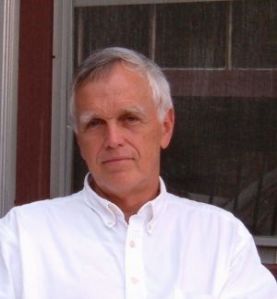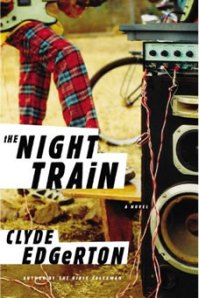“You’re dressed up,” Carla said from her chair in the playroom.
She’s mocking me, but I don’t care.
“If I get to meet the man, I don’t want to look like a hobo.”

At a time when good, churchgoing people are sleeping off Sunday lunch, I head to the Decatur Book Festival to hear and hopefully meet my favorite writer, Clyde Edgerton.
Heavy clouds finally threaten rain after a two-week absence. The traffic is light, but Jim and Don tell me the Braves are losing to the Dodgers 3-0. I look up at Stone Mountain on my left as I accelerate onto Highway 78. I’m always amazed by that piece of granite.
“Why am I nervous?” I think as I find a seat on the fourth row of the right center section in the First Baptist Church of Decatur sanctuary. It’s half an hour before it’s supposed to start, but there are already a good number of folks finding their seats.
I decide I’m more excited than nervous. I wish I had brought something to read. It would have been nice if I had brought a copy of the book for Clyde to sign, but, alas, in this digital age I have it downloaded on my Kindle. Don’t want him autographing that.
I pull out my Moleskine and start jotting notes, impressions really, of the scene. Old journalist’s habits die hard.
I wonder if I might see my buddy, Keith, a North Carolinian book editor who let me borrow Edgerton’s books on tape when I was commuting from Macon to Atlanta. I developed an appreciation for Edgerton’s humor and ability to create three-dimensional characters back in 1994 when I read “Walking Across Egypt” and “Killer Diller.” My fondness grew into adoration when I got to hear Edgerton performing more than reading “Raney” and “Where Trouble Sleeps” on the cassettes Keith loaned me. His dialogue was so authentic and the dialect so real.
The auditorium is a little more than half full when in walks Edgerton, wiry and energetic, a backpack slung over one shoulder like the students he teaches at UNC Wilmington. Round gold wire-rim glasses, a white button-down shirt with the sleeves rolled up, khaki dress pants and some type of hiking sandal make up his wardrobe. He’s taller than I thought he’d be, but he carries himself with a hint of mischief, just like I had imagined.
He talks graciously with a few of the event organizers before setting his notes on the podium. He goes to the piano and picks out a tune, gaging the sound. He confers with the sound guy.
Who I later learn are long-lost former neighbors and an Air Force buddy find him in a flurry of hugs and laughter. I’m secretly jealous.
The church’s lower level is full, and four women fill in the rest of my pew, trapping me in the middle. The view is great, but I begin to doubt I’ll have a chance to meet him.
Then, a guy in cargo shorts in front of me gets up and walks over to him. I can’t believe it. He just got up and walked right over there and talked to Clyde Edgerton. And he was wearing shorts!
A woman from the Decatur Book Festival takes the microphone and encourages us to Tweet and tells us there will be time for questions before Edgerton will go to a tent
outside to meet people and sign copies of books. Dang Kindle.
Atlanta author Charles McNair provides a magnificent introduction, retelling how he suggested to Edgerton in an e-mail that his remarks might go something like this: “Someday William Shakespeare will be called the ‘Clyde Edgerton’ of his day.” McNair tells us Edgerton responded “Sounds about right.”
Full of nervous energy and overly conscious of his 45-minute time limit, Edgerton dives in with two relatively recent stories, one on his 29-year-old daughter in a hardware store and the other about taking his three younger kids to the open casket funeral of his aunt who “got kicked out of hospice because she wouldn’t die.”
 He gets to the main event in short order telling us his new novel “The Night Train” is about “music and friendship.” Edgerton, who himself played in a rock-and-roll band in the early 1960s, translates his experience into the story of a white kid trying to recreate James Brown’s “Live at the Apollo” album note-for-note. The boy forms a forbidden friendship with an African American teen named Larry Lime looking to escape the South by becoming the next Thelonious Monk.
He gets to the main event in short order telling us his new novel “The Night Train” is about “music and friendship.” Edgerton, who himself played in a rock-and-roll band in the early 1960s, translates his experience into the story of a white kid trying to recreate James Brown’s “Live at the Apollo” album note-for-note. The boy forms a forbidden friendship with an African American teen named Larry Lime looking to escape the South by becoming the next Thelonious Monk.
Edgerton reads the opening pages of the story, and although the words were familiar, Edgerton brings them to life, infused with his energy, passion and perfect pitch dialects.
The 45 minutes fly by. He plays and sings a tune he calls “Fat from Shame” and shares samples of “The Jam Part 1” and “I Need Your Lovin’ Every Day” by holding his Apple laptop next to the podium microphone.
“If I had an hour I’d play all of these,” he says with a grin.
Too soon we’re into the question and answer session, and like a rookie just called up to the majors, I am frozen. My mind is blank. I have so many questions. People are firing off their questions left and right, almost as if they had rehearsed them. Why didn’t I rehearse?
He tells them he’s listening to Randy Newman and a jazz pianist named Monty Alexander on his iPod these days and that his next book is going to be about fatherhood. He even gives us a sneak peak at the first two sentences: “Before the baby comes, install the car
seat and put together the crib. It will take four to seven days.”
He whets our appetite for his next novel, a book about a rag-tag group of guys who are paid to perform 21-gun salutes at military funerals.
“There’s going to be lots of tension and suspense in this book. You’ve got to have tension and suspense in a novel.”
He closes with another tune from his laptop. He says he wanted this musical concoction to be the real title of “The Night Train,” but his editors would have nothing to do with it.
He smiles broadly as the song integrates Stravinsky with James Brown.
The room swells with applause, and before I can escape my pew, Edgerton is escorted to the book-signing tent on the lawn. When I do make it out of the church, the line is already a hundred deep and a sprinkle is picking up steam.
I decide I’ll meet one of my heroes another day. Instead, I revel in the enjoyment of the written and spoken word, so ably crafted by one of the South’s most gifted storytellers.
I get in my car to hear Prado single to left, driving home Constanza. Braves win in the bottom of the ninth.
It was an afternoon well-spent.
